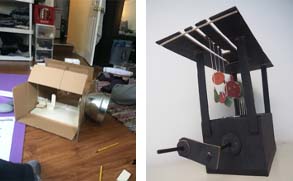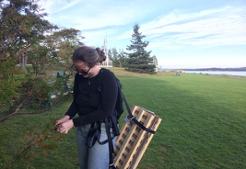History of Science and Technology (HOST) student Faye Hiscock interviewed Abagail about her experience at King’s and how it prepared her for graduate work at University of Leeds. Originally from Massachusetts, Abagail recently graduated from King’s with a combined honours in HOST and History. She now studies Curating Science at Leeds in the UK.
Could you tell me a bit about your experience in HOST, and especially your engagement with all of the historical constructions you made for different classes (Dr. McOuat tells me there were quite a few)?

Abagail’s Intonarumori (left) and Hungry Caterpillar (right) machines.
In HOST, I was very interested in the hands-on, instrumental side of science and technology. In my third year at King’s, I built an Intonarumori, which is a futurist noise making machine, as a group project. Because my class was so small (there were two of us), we had the advantage of extra attention, and in my fourth year I made pressed plants as a seminar project, and I also built an automaton of The Very Hungry Caterpillar with my then partner now husband, Guy. I found that many King’s students were interested in the conceptual, philosophical side of HOST, and though this was intriguing to me, scientific instruments were my main point of interest.
How has this prepared you for your proposed work in graduate school at Leeds and your career?
My time at King’s prepared me for graduate school, because the UK education system is very much focused on essay writing, and I definitely spent a lot of time doing just that at King’s. Besides quality writing, King’s also values in-class discussions, which prepared me for grad school at Leeds by helping me connect to my professors, helping me to be verbally prepared, and helping me to think broadly.
Why made you decide to come to King’s? I hear you are from the US, so was King’s more desirable as a school because of its location?
My high school advisor wanted a student to go to King’s, because of its renown for reading and writing — and liberal arts in general. FYP and HOST were main draws for me, because of their unique curricula and because history of science was already of interest to me. Canada was a big draw for me, because it is more multicultural, yet it is also close to home. I find the Canadian identity to be more open. Also, tuition is much cheaper in Nova Scotia. King’s has such a broad world.
I hear you live in Woods Hole, one the great centres of natural history and biology.
Yes, Woods Hole has a geographic institution and a biological research association (marine specifically), so the atmosphere in which I was raised set the stage for my interest in HOST.
What are some of your favourite class moments?
My most memorable class moment, I think, was in my first class with Gordon [McOuat]. It was a fourth year class and I was only in my second year, and he told us that taking this class was like taking a swan dive into a five gallon bucket of water. He taught me that it was fair game to work on things besides philosophical concepts in HOST. I am also thankful for Melanie [Frappier], as she helped me to think about HOST things applicably in the world.
Tell me about your MA dissertation.

Abagail with the plant press she built for HOST 4001 in 2017.
I carried my fourth year seminar project into my dissertation. It is now called: “Our emotional connection to living collections”. I decided to do a study on plant collections and I used Facebook as the medium to discuss this. I need to thank Jannette Vusich, because she introduced me to the importance of memes as an image lens, which has greatly assisted me in my studies. I am studying Curating Science at Leeds, so art history and history of science is definitely melded. I am only part of the second class in this programme, so it is a relatively new MA at Leeds, but there is so much support for students in the department. My classmates come from many different academic backgrounds, which gives me the opportunity to learn more from them. I definitely want to pursue a PhD in the UK after I graduate from Leeds this year.

